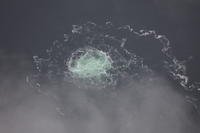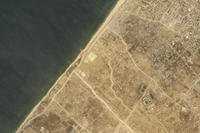Today's Times has a fascinating story out of Afghanistan. Well, more like above it, really. Reporter David Cloud hitched a ride on a "B-1 bomber orbit[ing] at 20,000 feet, responding to radio calls from American and Canadian troops who asked the plane to use its radar to watch for insurgent forces and to be prepared to drop bombs."
The Air Force has conducted more than 2,000 airstrikes in Afghanistan over the past six months, a sharp increase in bombing that reflects the growing demand for American air cover since NATO has assumed a larger ground combat role, Air Force officials said...
The NATO forces are mostly operating without heavy armor or artillery support, and as Taliban resistance has continued, more air support has been used to compensate for the lightness of the units, Air Force officials said. Most of the strikes have come during close air support missions, where the bombers patrol the area and respond to calls from ground units in combat rather than performing planned strikes...
To carry out the heavier mission load, the Air Forces entire complement of B-1 bombers was shifted over the summer from the British air base at Diego Garcia in the Indian Ocean to a Middle Eastern airfield closer to Afghanistan. The new basing arrangement shortens the flying time to Afghanistan by two hours, allowing bombers to remain overhead for longer periods between refueling by aerial tankers...
The 2,095 attacks by American aircraft since June is many times greater than the number of airstrikes in Iraq, where the terrain and nature of the conflict are less susceptible to bombing campaigns. There have been only 88 attacks by American aircraft in Iraq since June, according to Air Force figures. Unlike in Afghanistan, insurgents in Iraq are largely in urban areas and do not often mass in groups large enough to warrant use of airstrikes, Air Force commanders said.
I think we al know how effective close air support can be. But is it really a substitute for having fewer troops on the ground?








